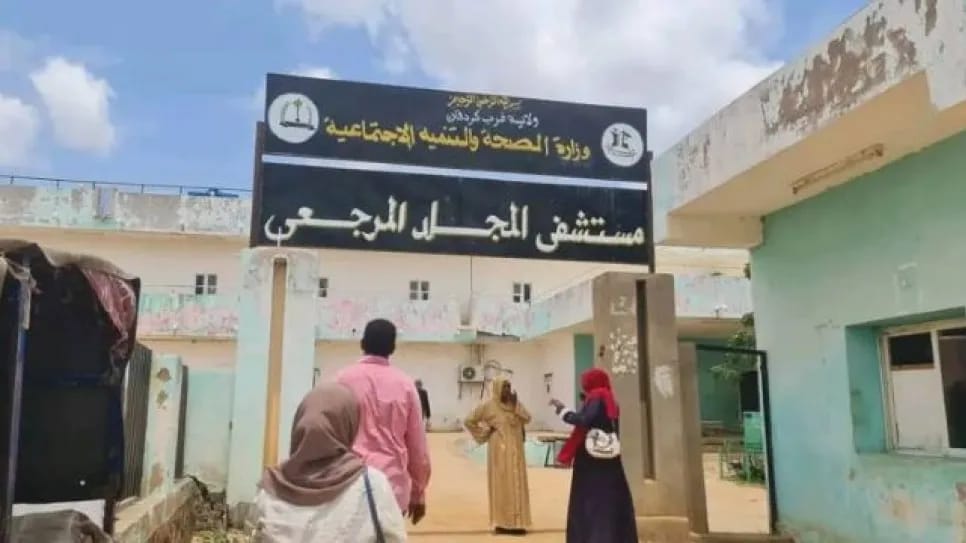At the heart of war-torn and displaced Sudan, a deepening humanitarian catastrophe unfolds in West Kordofan, where women and children face grave threats amid the near-total collapse of health infrastructure and an unprecedented deterioration in shelter and living conditions.
An investigation by Mashawir inside displacement centers across the state revealed shocking statistics: a sharp rise in maternal and child mortality, driven by the shutdown of nearly 85% of hospitals, a severe shortage of medical staff, and the absence of essential medicines and healthcare services.
Mass Deaths
According to a report from the charity Muzna Organization, obtained by Mashawir, the Fula Hospital alone recorded the deaths of nine mothers and 21 children in December 2024, in just one month. Childbirth has become a life-threatening ordeal, with cesarean sections costing around 200,000 Sudanese pounds, a sum beyond the means of most residents.
Huwaida Al-Tahir, Director of Muzna, stated:
> “Health services are nearly non-existent—no medicine, no personnel, no equipment. Women are giving birth in catastrophic conditions. Many lose their lives, or their children’s, due to this structural neglect.”
Life Without Dignity: Overcrowded and Impoverished Shelters
Displaced women in camps endure harsh living conditions. In the Nahr Atbara camp in River Nile State, one woman said that women lack privacy and are forced into informal labor just to survive. Some resort to extreme measures to meet basic needs, including taking medications to stop their menstrual cycles due to the unavailability of sanitary pads.
Activist Siham Mohamed Issa, from the Taria camp in Gedaref, confirmed that women are exposed to violence and harassment due to the absence of safe spaces and legal protections. She also noted severe shortages of food, hygiene products, and clean water, resulting in outbreaks of infectious diseases.
Silent Human Rights Violations: Sexual Violence and Exploitation
Buthaina Hammad, a supervisor in multiple camps, spoke of repeated waves of displacement that have exhausted women, many of whom now bear sole responsibility for their families amid the absence of husbands or steady income. Many have faced sexual exploitation or have been forced to marry off their underage daughters to protect them from harassment.
Buthaina added:
> “In the Al-Mujlad incident, an airstrike targeted the maternity hospital and the dialysis center, killing 57 civilians, including pregnant women and chronic patients—a horrifying massacre that failed to stir the world’s conscience.”
Unequal Support and Official Neglect
Activist Nada Hashim highlighted a stark disparity in support between government-run and volunteer-led displacement centers.
> “Government centers receive support, while the others—despite housing the majority of displaced people—are left to fend for themselves.”
Another report by Muzna revealed that 33.3% of women in Kordofan never completed basic education due to early marriage, 7.6% lost their jobs due to the war, and over 2% of displaced women have suffered ethnically motivated violence.
School Closures and Psychological Breakdown
Many girls have dropped out of school due to displacement, and the few remaining educational services suffer from poor quality and unsuitable facilities. Many women face psychological distress stemming from grief, isolation, and an uncertain future.
Nada Hashim noted that bathrooms in the camps are unclean, and there are no safe or separate spaces for women, exposing them to exploitation and threatening their physical and mental well-being.
Food and Medicine Shortages
The investigation also documented delays of several months in the distribution of World Food Programme rations, forcing families to beg or send women to work in farming or firewood collection.
In the Shujairat camp alone, six cases of child rape were recorded since the war began. Diseases such as jaundice, malnutrition, malaria, and scorpion stings are widespread, with almost no medical response.
A Merciless War
This tragedy unfolds in the broader context of Sudan’s ongoing war, which erupted in April 2023 between the army and the Rapid Support Forces (RSF). For West Kordofan—a region already burdened by long-standing marginalization—the conflict has delivered a fatal blow to its remaining health, education, and social systems.
Mona, a member of Muzna, explained that the organization supported nine centers in Fula and four more in Nahud and Abu Zabad, but security threats and RSF-imposed restrictions have severely hampered operations.
> “We refuse to partner with armed groups that impose conditions on humanitarian work,” she said.
The report concludes that what women truly need goes beyond food and medicine—they need dignity, privacy, and safety. As the international response lags and the state remains absent, women continue to pay the heaviest price—as victims of war, poverty, and systemic neglect.
The Forgotten Corner
In this forgotten corner of Sudan, the cries of mothers and the tears of children still await someone to listen.
